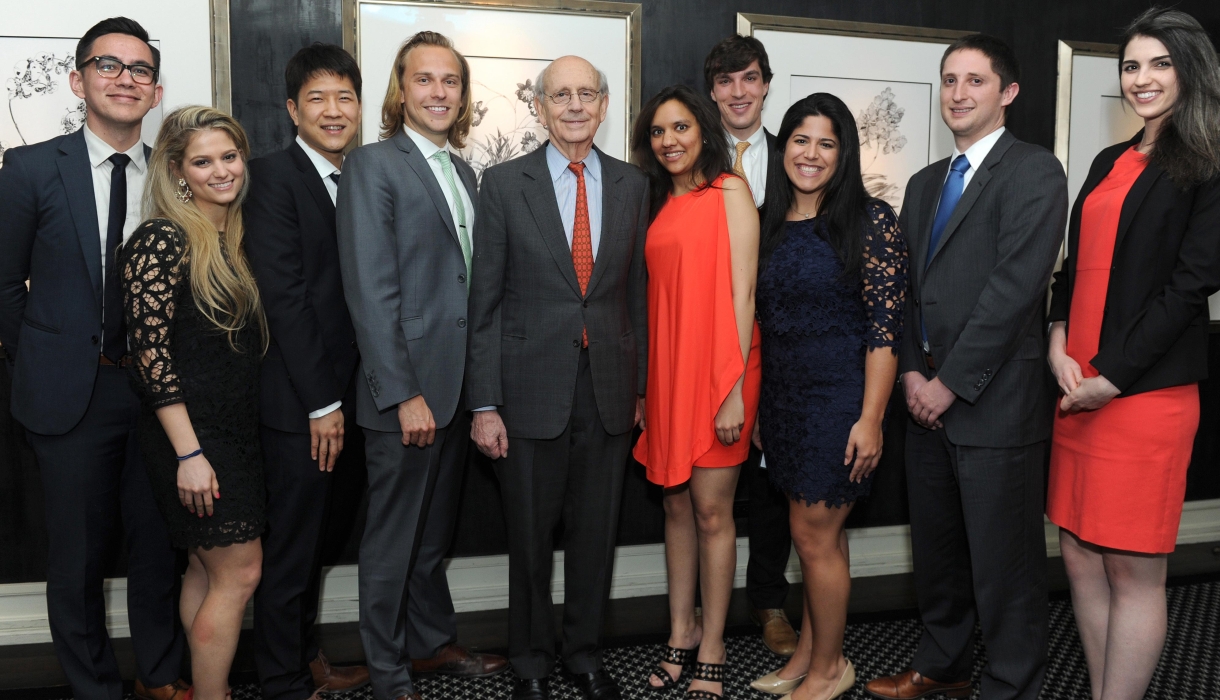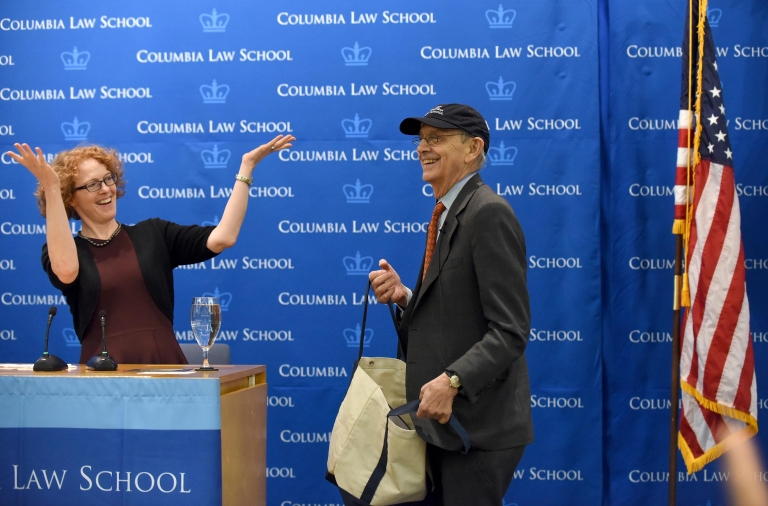Supreme Court Justice Stephen Breyer Honored at Wolfgang Friedmann Memorial Banquet
Breyer also delivered the keynote address at the annual Friedmann Conference.

U.S. Supreme Court Justice Stephen G. Breyer with members of the Columbia Journal of Transnational Law at the 2017 Wolfgang Friedmann Memorial Banquet.
In a globalized world, where distinctions between what is purely domestic and what is purely international are increasingly blurred, judges and lawyers should look to the laws and norms of other countries to determine the best way to solve the challenges of our time, said U.S. Supreme Court Associate Justice Stephen G. Breyer while accepting the Columbia Journal of Transnational Law’s Wolfgang Friedmann Memorial Award at the publication’s annual dinner on April 12. Breyer received the award from Anjli Parrin ’17, editor in chief of the journal, during the 43rd Annual Wolfgang Friedmann Memorial Banquet, held at the 21 Club.
To illustrate the interplay between domestic and international laws, he described for the students, faculty, and alumni attending the dinner the work of three Catalonian architects who won the 2017 Pritzker Architecture Prize last month for, according to the announcement, seeking “connections between the exterior and interior,” among other things. (Breyer has served on the jury for the prize since 2012.)
“They’ve taken two major facts: international style and regional and local preferences, and they’ve solved whatever tension between them,” Breyer said. “They solved it. They show both. Globalization, regionalism, localism—those are not ideals. They are facts. They are facts about the world, and the job for the architect, which I think is the job for judges and the job for lawyers, is how do we solve our problems in a world where both are important forces.”
Breyer’s remarks capped off an evening that celebrated the Columbia Journal of Transnational Law’s rich history. The publication was founded by Columbia Law School Professor Wolfgang Friedmann in 1961 “upon the belief that international law has the potential to further peaceful relations among nations and to combat mass injustice,” said Parrin. P. Nicholas Kourides ’71, the current chairman of the journal’s board who also served as editor in chief during his time as a student, spoke about Friedmann’s many contributions to the field of international law, including hundreds of published articles. The Wolfgang Friedmann Memorial Award was created to honor the scholar after he was killed in an attempted robbery in 1972.
Noting the award’s accomplished past recipients, including the late U.N Secretary General Boutros Boutros-Ghali and now retired U.S. Supreme Court Justice Sandra Day O’Connor, among others, Columbia Law School Dean Gillian Lester said it was her pleasure to “add another tremendously distinguished name to the list.”
“Justice Breyer has consistently articulated a bold vision in favor of drawing upon and learning from the laws of other nations as well as learning from international law,” she said in her introductory remarks at the banquet. “He’s challenged us to reckon with an increasingly globalized world and the increasingly globalized nature of the cases that are decided.”
Indeed, Breyer said that when he joined the court nearly 23 years ago, he could count on one hand the number of cases that required the justices to “know something that was going on outside our borders.” In the last few years, he said, such cases make up 15 to 20 percent of the court’s docket.
“That reflects not us, nor our preferences,” he said. “It reflects the world.”
In an often humorous speech, Breyer said that discovering how best to reconcile international and domestic concerns is the job of the legal community.
“Lawyers are pretty good at problem solving,” he said. “This is a big one, and I have confidence. They’ll solve it. Law students too.”
At the dinner, journal editors Erin Brown ’17, Samuel Kwak ’17, and Martin Willner ’17 were all honored for outstanding service to the publication. Rachel Flieg-Goldstein ’18 and Kailey B. Flanagan ’18 also won the Debevoise & Plimpton Student Writing Prize in Comparative and International Law. The banquet was organized by the journal’s Public Affairs Editors Thomas White ’17 and Rebecca Urquiola ’17.
The next day, at Jerome Greene Hall, Breyer served as the keynote speaker at the annual Wolfgang Friedmann Conference, put on by the journal and the Columbia Society of International Law. His address, named for his most recent book, The Court and the World, examined the work of the Supreme Court of the United States in an increasingly interconnected world.
###
Posted on April 18, 2017
